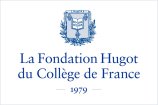In 1530, Francis I founded the Collège des lecteurs royaux, now the Collège de France, to provide the nation with the knowledge it needed. One hundred and fifty years later, in 1680, Louis XIV founded the Comédie-Française, entrusting it with the monopoly of Parisian theater. From the stage of knowledge, as orchestrated for nearly five hundred years by the Collège de France, to the knowledge of the stage, admirably concentrated in the more than three-hundred-year-old experience of the Théâtre-Français, many parallels can be drawn between the two institutions, both royal in creation and ultimately adopted by the Republic. As Éric Ruf's ten-year tenure at the helm of Molière's troupe draws to a close, the King's teachers invite the King's actors to share their knowledge of the theater, and to talk about what it means to them to act, to direct, to speak verse and prose, to embody life and society, and to take to the stage to speak about the world and to the world. Theater is knowledge : in 2025, the Collège de France and the Comédie-Française have decided to join forces to celebrate it in seven exceptional encounters from January to June.
With the support of the Collège de France Foundation Hugot.

In partnership with Télérama.










